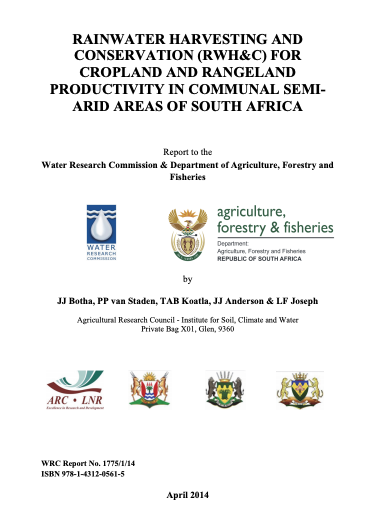Rainwater Harvesting and Conservation for Improved Cropland Production in Communal Areas of South Africa

The general aim of the research was to assess rainwater harvesting and conservation (RWH&C) techniques/practices and related institutional arrangements for improved rangeland and cropland productivity in communal areas through on-station (controlled) and on-farm (participative) research. In order to achieve this, ten objectives were identified. These objectives were formulated in the project proposal as follows:
a) To select the final study areas from the short-list in the proposal and to justify the selection in terms of how the results could be extrapolated.
b) To perform a literature review on local and sub-Saharan experience in the context of RWH&C for rangeland and cropland, institutional arrangements and semi-arid areas.
c) To interact with the selected communities to gain understanding of institutional arrangements and possible failures and to gain support at Tribal Authority level and with participating individuals/households.
d) To describe the study areas with reference to natural resources (water, soils, vegetation, climate), human resources (demographics – gender, age, vulnerability, etc.) and the institutional and organisational environment.
e) To identify and describe the farming systems (rangeland, cropland, crops and livestock, and interactions amongst these) and to analyse the current practices within the existing farming system to ascertain: what works, what does not work and what could be improved.
f) To identify and describe the institutional arrangements (working rules) and to assess the extent to which production on rangeland and cropland was suppressed (land lying fallow/overgrazed/dysfunctional/non-functional) or can improve with functional working rules.
g) To identify and propose applicable/possible solutions (technically feasible, institutionally appropriate and socially acceptable) towards viable farming systems through interaction with individuals/groups (including extension services) in the village.
h) To investigate workable institutional improvements through rediscovery of previous functional working rules, reintroduction of previous operating rules where appropriate and/or by formulating new working rules and through enforcement of existing or new rules if necessary for implementation of the identified RWH&C techniques and practices.
i) To perform on-station and on-farm research and testing/application of appropriate RWH&C techniques and practices specifically for rangelands and croplands.
j) To produce guidelines on best management practices for RWH&C for rangeland and cropland productivity in communal areas.